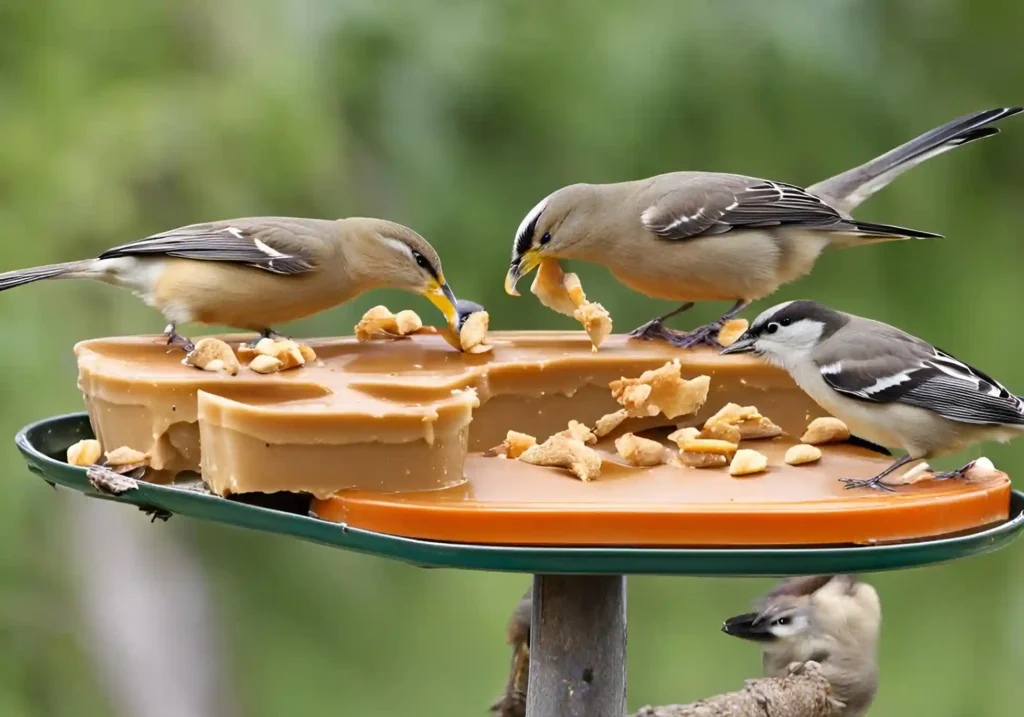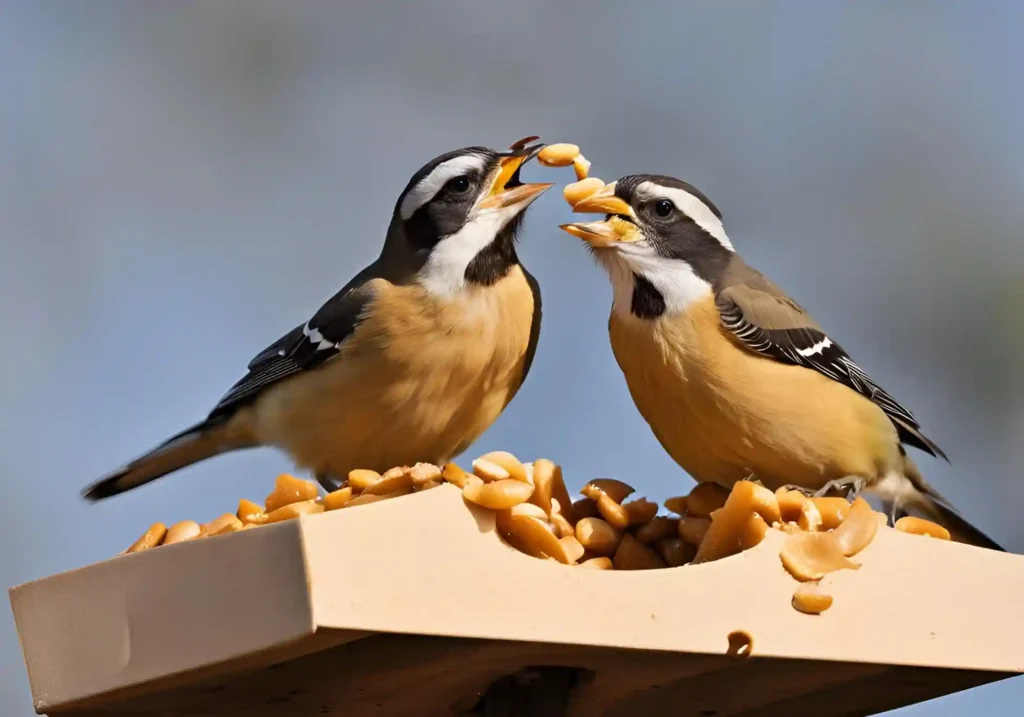Ever wondered if birds can eat peanut butter? The answer might surprise you! Yes, birds can enjoy peanut butter, and many of them absolutely love it.
It’s a tasty, protein-packed treat that can give them an energy boost. Whether you’re feeding wild birds or have a pet bird at home, peanut butter can be a fun and nutritious snack in moderation.
Let’s look at all the answers for queries that have been searched by users so that they can get answers to their curious questions.
Do Birds Eat Peanut Butter?
Yes, birds can eat peanut butter, and they tend to love it! It’s rich, full of fats and protein, and can be a tasty treat for both wild and pet birds. Peanut butter offers birds a good energy boost, especially during colder months when they need more calories to stay warm.
However, like any food, it should be fed in moderation to ensure it doesn’t cause any health issues to them.
Is Peanut Butter Safe for Birds?
Peanut butter is generally safe for birds, as long as it’s given in small amounts. It’s a good source of fat and protein, which can help birds stay energized.
However, some peanut butter brands contain additives, salt, or sugar, which aren’t ideal for birds. Opting for a natural, unsalted variety without added ingredients ensures that your bird stays healthy while enjoying this treat.
What Types of Peanut Butter Are Best for Birds?
The best type of peanut butter for birds is natural, unsalted peanut butter without any added sugar or preservatives. Many commercial peanut butters are packed with extra ingredients that aren’t great for birds.
Look for peanut butter that only lists peanuts as the main ingredient. This will ensure that your feathered friends are getting a pure, healthy snack.
Can Peanut Butter Hurt Birds?

Peanut butter itself won’t hurt birds if given in moderation and if you choose a natural, simple variety. However, too much peanut butter can be an issue. Its sticky texture might be hard for some birds to swallow, especially if they eat too much at once.
It’s important to serve it in small amounts and to mix it with other bird-friendly foods like seeds or oats to make it easier for them to handle.
Do Birds Prefer Unsalted Peanut Butter?
Yes, birds do prefer (and benefit from) unsalted peanut butter. Salt is not necessary for birds, and too much salt can be harmful to their health.
Unsalted peanut butter provides all the nutrition they need without the risks that come with added salt. If you’re offering peanut butter to birds, always check the label to ensure it’s salt-free.
How Do I Feed Peanut Butter to Birds Safely?
To feed peanut butter safely to birds, you can spread it on tree bark, mix it with birdseed, or use it to coat pinecones as a treat. It’s best to offer it in small amounts so that birds can peck at it rather than trying to swallow large globs.
You can also soften the peanut butter by mixing it with oats or seeds, making it easier for birds to eat and reducing the risk of choking.
What Are the Risks of Feeding Birds Peanut Butter?
One risk of feeding peanut butter to birds is its sticky texture, which can sometimes make it difficult for birds to swallow. If a bird eats too much at once, it might have trouble getting it down, leading to potential choking hazards.
Additionally, if the peanut butter has added salt or sugar, it can be harmful over time. Always make sure to offer peanut butter in moderation and mix it with other foods to make it less sticky.
Is Peanut Butter Good for Wild Birds?
Yes, peanut butter is good for wild birds, especially in the winter months when they need extra energy to stay warm. It provides them with fats and protein that help keep their energy levels high.
You can offer it by spreading it on bird feeders, tree branches, or mixing it with seeds for an extra boost. Just ensure it’s natural and unsalted, and wild birds will enjoy it as a nutritious treat.
How Often Should I Give Peanut Butter to Birds?
Peanut butter should be an occasional treat for birds rather than a regular part of their diet. Feeding it once or twice a week is fine, but it shouldn’t replace other essential foods like seeds, grains, and fruits.
Birds need a balanced diet, so peanut butter should only make up a small portion of what they eat, even if they love it.
What Other Foods Can I Mix with Peanut Butter for Birds?
You can mix peanut butter with birdseed, oats, or chopped nuts to make a tasty and easy-to-eat treat for birds. Some people like to coat pine cones with peanut butter and then roll them in seeds to hang outside for wild birds.
Mixing in dry food makes the peanut butter less sticky and easier for birds to handle, while also adding variety to their diet.
Can Birds Choke on Peanut Butter?
Yes, there’s a small risk that birds could choke on peanut butter if they try to eat too much at once or if it’s too sticky. To reduce the risk, always feed peanut butter in small amounts and mix it with seeds or other dry food.
This makes it easier for birds to peck at and prevents them from getting large globs stuck in their throats.
Can Birds Eat Rancid Peanut Butter?
No, birds should not eat rancid peanut butter. If peanut butter has gone bad, it can be harmful to birds just like it would be to humans. Always check the expiration date and make sure the peanut butter smells fresh before offering it to birds.
Spoiled peanut butter could make birds sick, so it’s better to be safe and throw it out if it’s past its prime.
Can Birds Eat Peanut Butter on Bread?
Yes, birds can eat peanut butter on bread, but it’s not the best option for them. Bread doesn’t provide much nutritional value for birds, and too much bread can actually fill them up without giving them the nutrients they need.
If you want to offer peanut butter on bread, do so in very small quantities and make sure the bread is whole grain without added sugar or salt.
Can Birds Eat Peanut Butter in the Winter?

Yes, peanut butter is especially good for birds in the winter. The fats and protein give them the extra energy they need to stay warm during cold months.
It can be harder for birds to find food in the winter, so offering them peanut butter mixed with seeds or oats can be a great way to help them out. Just make sure it’s natural and unsalted.
Can Parrots Eat Peanut Butter?
Yes, parrots can eat peanut butter, and many of them enjoy it! It provides them with healthy fats and protein, but as with other birds, moderation is key.
Peanut butter should only be an occasional treat for parrots, not a staple food. Make sure the peanut butter is natural and doesn’t contain added sugars, salts, or preservatives that could harm your parrot.
Can Birds Have Peanut Butter Crackers?
It’s not recommended to feed birds peanut butter crackers. Crackers often contain added salt and preservatives that aren’t healthy for birds.
While peanut butter itself can be a good treat, crackers don’t provide much nutrition and the salt content can be harmful to birds. If you want to give them peanut butter, it’s best to stick to natural peanut butter without any crackers.
Is Peanut Butter Good for Birds?
Yes, peanut butter can be good for birds when given in moderation. It’s rich in fats and proteins, which help keep birds energized and healthy.
However, it should not make up the majority of a bird’s diet and should be offered alongside other nutritious foods. As long as you choose the right type of peanut butter (natural and unsalted), it can be a tasty and beneficial treat.
The Dangers of Peanut Butter
While peanut butter is generally safe for birds, there are a few risks. The sticky texture can cause choking if a bird eats too much too quickly. Additionally, peanut butter with added salt, sugar, or preservatives can be harmful over time.
Birds with a diet too high in fats, such as peanut butter, might also gain excess weight. It’s important to feed it carefully and in moderation.
How to Safely Serve Peanut Butter to Birds
To safely serve peanut butter to birds, always choose a natural variety without added salt, sugar, or preservatives. Spread it thinly on bird feeders, tree branches, or pinecones, or mix it with birdseed and oats to make it less sticky and easier for birds to eat.
Serving small amounts and mixing it with dry foods reduces the risk of choking, and it ensures birds get a balanced treat.






